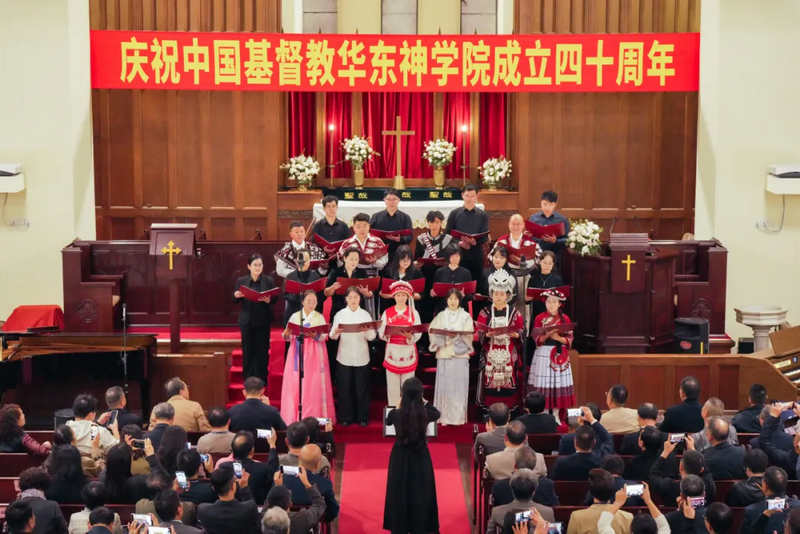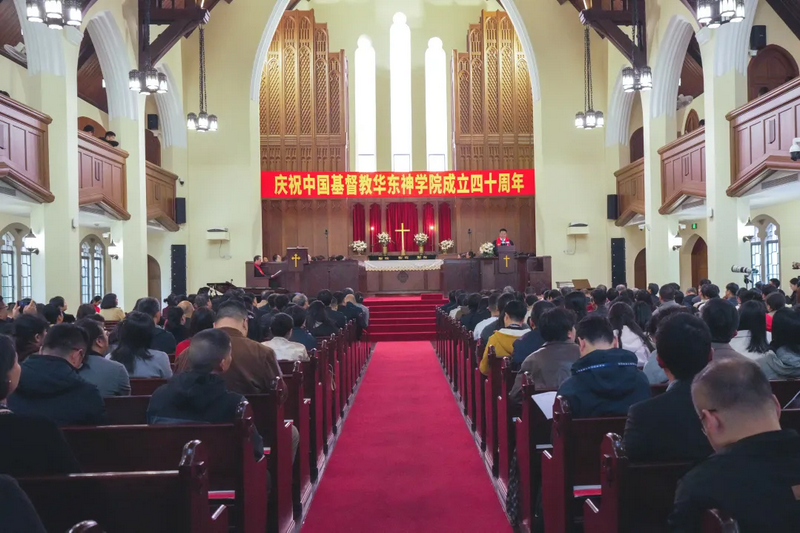On November 13–14, East China Theological Seminary marked its 40th anniversary and convened the 2025 Annual Meeting of its Board of Directors.
According to the seminary, during the Thanksgiving service on November 14, Rev. Yu Guangzhi, chairperson of Shanghai Municipal CC, presided over the proceedings. Rev. Li Yungen, president of Jiangxi Provincial CC, offered the opening prayer; Rev. Wang Mengkun, vice president of Shandong Provincial CC, read the Scripture; and Rev. Shan Weixiang, vice chairperson of the national TSPM, delivered a sermon titled "Preachers' Empathy," drawing from Romans 12:15 and 1 Corinthians 9:22. The service concluded with a benediction by Rev. Cao Shengjie, former president of CCC.
Following the service, the seminary held a symposium on the sinicization of theological education. Rev. Shan Weixiang, Rev. Xu Yulan, chairperson of Shanghai Municipal TSPM, and Rev. Pan Xingwang, chairperson of Zhejiang Provincial TSPM, delivered keynote addresses. Scholars and experts, including Yan Kejia, a researcher at the Institute of Religious Studies of the Shanghai Academy of Social Sciences, offered recommendations on advancing the Sinicization of Christian theological education through historical analysis, contemporary reflection, and prospects.
The event drew more than 300 participants, including members of the seminary's board, government officials, scholars, leaders of district-level CC&TSPMs in Shanghai, alumni representatives, external lecturers, and faculty and student representatives.
On the evening of the 13th, the seminary hosted a commemorative concert structured around three movements, "Reflection and Gratitude," "Prayer and Vision," and "Praise and Blessing." Centered on sacred music, the concert highlighted the seminary's artistic achievements in exploring the sinicization, featuring performances such as handbells, solos, duets, and mixed choral works.
At the 2025 Annual Board Meeting on November 13, the Board received and reviewed the 2024 Academic Year Work Report presented by Dean Rev. Xie Bingguo. The report outlined the seminary's major achievements over the past year in teaching development, faculty training, curriculum reform, and the advancement of the Sinicization of theological education. It also provided a systematic summary of the seminary's experience in areas such as talent cultivation, inter-institutional exchanges and cooperation, aesthetic education initiatives, and training programs for grassroots churches.
Board members held in-depth discussions on key issues, including the seminary's educational positioning, curriculum enhancement, faculty development, and the cultivation of students' overall competencies. The meeting affirmed the need to prioritize the training needs of grassroots churches and to integrate the principles of Sinicization into all aspects of curriculum design and instruction; to consistently strengthen inter-school exchanges and collaboration while developing high-quality, distinctive courses to improve students' comprehensive qualities; to deepen partnerships with churches across different regions, with particular attention to fostering students' reading habits and learning motivation; and to continue leveraging the seminary's strengths in aesthetic education and sacred music while refining faculty recruitment and training mechanisms.
Founded in 1985 by the CC&TSPMs of four provinces and one municipality in East China (Shandong, Zhejiang, Jiangxi, Fujian, and Shanghai), East China Theological Seminary relocated multiple times before settling in its current campus in Qingpu District, Shanghai, in 2000. The seminary occupies 17,843 square meters, with 7,635 square meters of building space. The theology program spans four years, with 60% of coursework in theology and 40% in general education. The Sacred Music Department, established in 2005, was authorized in 2011 by the State Administration for Religious Affairs to admit students from churches nationwide. In 2015, it launched a four-year undergraduate program in sacred music.
The seminary has more than 60 faculty members, including 14 full-time instructors and numerous part-time lecturers. Its library houses over 110,000 volumes. As of July 2024, the seminary has produced 1,641 graduates who are now serving in churches across the country.













